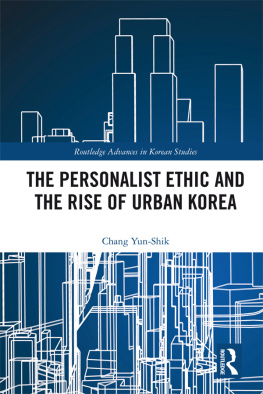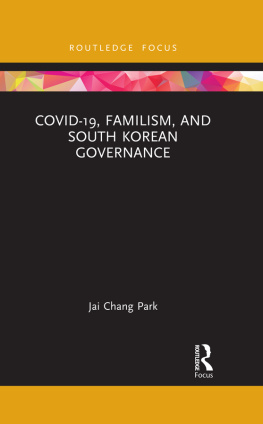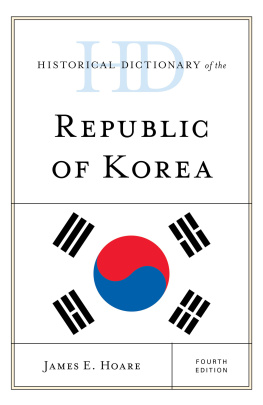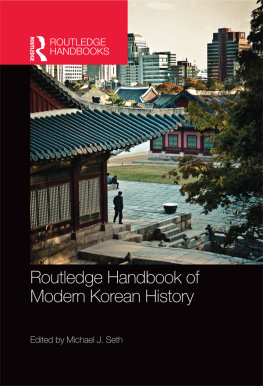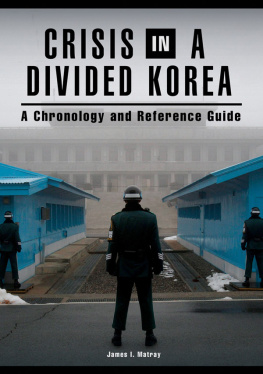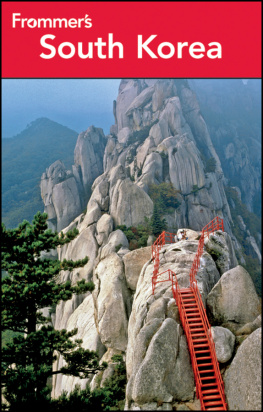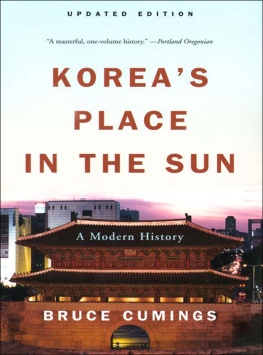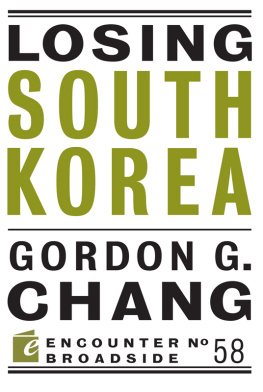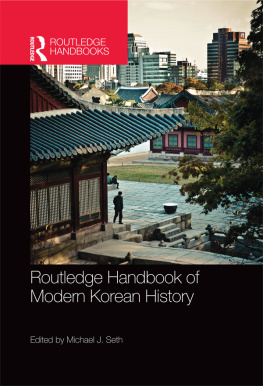The Personalist Ethic and the Rise of Urban Korea
This book reviews South Koreas experiences of kndaehwa (modernization), or catching up with the West, with a focus on three major historical projects namely, expansion of new (Western) education, industrialization and democratization. The kndaehwa efforts that began in the last quarter of the nineteenth century have now fully transformed South Korea into an urban industrial society. In this book, we will explore the three major issues arising from the kndaehwa process in Korea: How was the historical transformation made possible in the personalistic environment? How personalistic is modern Korea? And how difficult is it to build an orderly public domain in the personalistic modern Korea, and how do Koreans respond to this dilemma of modernization? As an examination of modernization as well as Korea, this book will appeal to students and scholars of Korean studies, sociology, politics and history.
Chang Yun-Shik is Emeritus Professor in the Department of Sociology at the University of British Columbia, Canada.
Routledge Advances in Korean Studies
For a full list of titles in this series, please visit www.routledge.com
29Leader Symbols and Personality Cult in North Korea
The Leader State
Jae-Cheon Lim
30The Failure of Socialism in South Korea
19452007
Yunjong Kim
31Nouveau-riche Nationalism and Multiculturalism in Korea
A Media Narrative Analysis
Gil-Soo Han
32Understanding Korean Public Administration
Lessons Learned from Practice
Edited by Kwang-Kook Park, Wonhee Lee and Seok-Hwan Lee
33Modern Korea and Its Others
Perceptions of the Neighbouring Countries and Korean Modernity
Vladimir Tikhonov
34Samsung, Media Empire and Family
A Power Web
Chunhyo Kim
35The Korean Tradition of Religion, Society and Ethics
A Comparative and Historical Self-Understanding and Looking Beyond
Chai-sik Chung
36Change and Continuity in North Korean Politics
Edited by Adam Cathcart, Robert Winstanley-Chesters and Christopher Green
37The Personalist Ethic and the Rise of Urban Korea
Chang Yun-Shik
The Personalist Ethic and the Rise of Urban Korea
Chang Yun-Shik
First published 2018
by Routledge
2 Park Square, Milton Park, Abingdon, Oxon OX14 4RN
and by Routledge
711 Third Avenue, New York, NY 10017
Routledge is an imprint of the Taylor & Francis Group, an informa business
2018 Chang Yun-Shik
The right of Chang Yun-Shik to be identified as author of this work has been asserted by him in accordance with sections 77 and 78 of the Copyright, Designs and Patents Act 1988.
All rights reserved. No part of this book may be reprinted or reproduced or utilised in any form or by any electronic, mechanical, or other means, now known or hereafter invented, including photocopying and recording, or in any information storage or retrieval system, without permission in writing from the publishers.
Trademark notice: Product or corporate names may be trademarks or registered trademarks, and are used only for identification and explanation without intent to infringe.
British Library Cataloguing-in-Publication Data
A catalogue record for this book is available from the British Library
Library of Congress Cataloging-in-Publication Data
Names: Chang, Yunshik, author.
Title: The personalist ethic and the rise of urban Korea / Chang Yun-Shik.
Description: Abingdon, Oxon ; New York, NY : Routledge, 2018. | Series: Routledge advances in Korean studies ; 37 | Includes bibliographical references and index.
Identifiers: LCCN 2017037394 | ISBN 9781138097902 (hardback) | ISBN 9781315104676 (ebook)
Subjects: LCSH: Korea (South)Economic conditions. | Korea (South)Social conditions. | Korea (South)History. | UrbanizationSocial aspectsKorea (South)
Classification: LCC HC467 .C366 2018 | DDC 330.95195dc23
LC record available at https://lccn.loc.gov/2017037394
ISBN: 978-1-138-09790-2 (hbk)
ISBN: 978-1-315-10467-6 (ebk)
Typeset in Times New Roman
by Apex CoVantage, LLC
For Sungbon
I am indebted to many people in producing this book.
As it should be obvious from the book, I draw heavily on the work of Ronald Dore. Less obvious are the many insights I gained from his other works not cited here. I particularly appreciate Dores help in formulating the concept of the personalist ethic in the form of lengthy comments on the papers I sent him and suggestions for revisions and additional readings.
I acknowledge receipt of financial support from the Korea Foundation for this book project and the Social Sciences and Humanities Research Council of Canada for other research projects related to this one, without which it would have been impossible to produce this book.
Daniel A. Bell, Lew Sok Chun, Michael Kew, Kim Uchang, Elvi Whittaker, and Yi Chaeyol commented on parts of the manuscript, for which I am very grateful. The uncommonly constructive review by an anonymous reader from Routledge proved to be most useful to me in revising it into the final version.
My thanks also go to Namlin Hur, Hyunho Seok, and Jaibong Hahm for inviting me to workshops they organized to present my ideas on the personalist ethic.
I have benefitted from numerous conversations I had with Donald Baker on Korean history and society over the years, and he has also helped me to translate a number of Korean phrases and sentences into English.
Encouragement I received from the late Alan Crawford, Neil Guppy, Namlin Hur, Steven Hugh Lee, Bob Ratner, Kristin Sopotiuk, Joseph Stefanich, Eui-Young Yu, and Elvi Whittaker served as pressure to finish writing the manuscript.
I was fortunate to have able research assistants, Jeong Lee, Sarah Lee, Jeongun Park, and Yoon Kyung Kim while preparing the manuscript.
I should specifically mention with gratitude Kim Aeryng in Korea for locating and sending me source materials in Korean; Vanessa LeBlanc for her careful editing of the manuscript which made the book more readable, orderly, and balanced; Kee Young Choi for his help in solving whatever problems I had with my personal computers; and Stephanie Rogers at Routledge for her humane professionalism.
Above all, I cannot thank my wife, Sungbon, enough for her support and intuitive comments on various points I made in the book. I dedicate it to her.
This book reviews South Koreas experiences of kndaehwa (modernization) or catching up with the West with a focus on three major historical projects namely, expansion of new (Western) education, industrialization and democratization. The kndaehwa efforts that began in the last quarter of the nineteenth century have now fully transformed South Korea into an urban industrial society.
At the time of Liberation in 1945, 70 percent of the Korean population was illiterate; only a small portion of the population had any school education. In the last decade of the twentieth century, both primary and junior high school education in South Korea were made compulsory. Senior high school education was not made compulsory, but it is nearly universal, and the majority of high school graduates (80 percent) advance to colleges or universities. As of 2011, the percentage of the Korean adult population aged 2564 who graduated high school was higher (81 percent) than that of the average of the Organisation for Economic Co-operation and Development (OECD) (75 percent).

